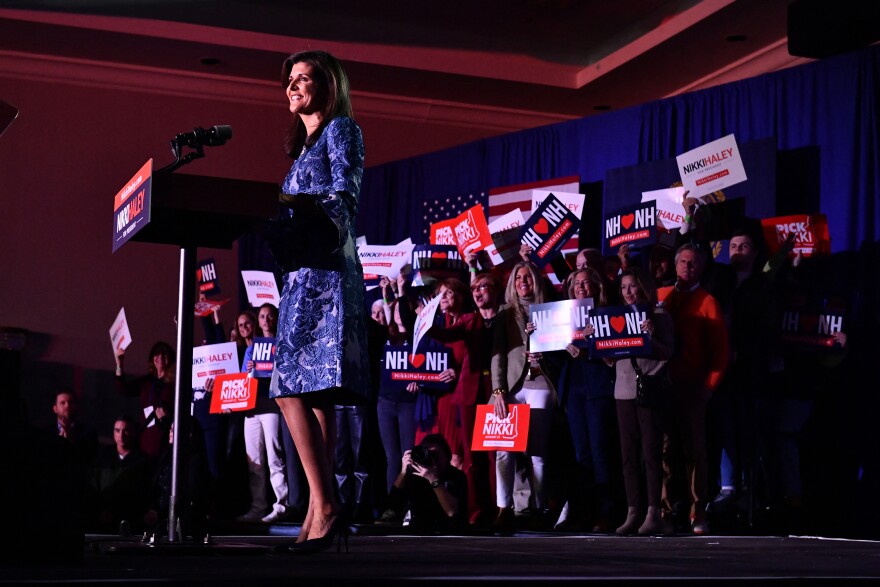Donald Trump beat Nikki Haley by a significant margin in New Hampshire — 11 points — despite nearly half the electorate being comprised of independent voters. Haley won 6 in 10 independents Tuesday, but lost three-quarters of Republicans.
It's hard to see another state favorable enough to Haley to give her the opportunity to dislodge Trump as the likely nominee. But Haley is vowing to continue on.
Loading...
Here are five takeaways from the New Hampshire results:
1. The clock is ticking on Nikki Haley's campaign
Haley said Tuesday night that she's forging ahead.
"New Hampshire is first in the nation; it is not last in the nation," Haley said. "This race is far from over. There are dozens of states left to go. And the next one is my sweet state of South Carolina."
She argued that she has increased in her support and that there are lots of other states still to vote. That's all true, but the road ahead doesn't look well paved for her.
The next contest is Nevada (Feb. 8), where she isn't even on the party caucus ballot. That means Trump is going to gobble up the delegates — and attention — there. (Haley is on a state-run primary ballot two days earlier that does not award delegates, and Trump isn't on that one.)

Then it's South Carolina (Feb. 24). Haley said she's looking toward that. She's scheduled a campaign rally in her home state Wednesday night and has begun spending money on ads there. But South Carolina looks more like Iowa than New Hampshire. And it will be hard for Haley to explain away a loss in the state where she was governor.
2. Is Haley really going to want to endure a month of Trump's attacks?
In addition to the long odds because of the party demographics Haley faces, there's also the issue of time. South Carolina isn't for another month.
Is Haley going to be able to hold onto the resources it requires for her to stay on the air in a significant way for that length of time? Can she maintain her loose coalition, even as the party moves increasingly toward rallying around Trump.
Even Texas Sen. John Cornyn, who has been lukewarm on Trump since the former president left the White House, came out and endorsed Trump Tuesday night.
What's more, Trump and his allies are vowing to go after Haley even harder than they already have — and Trump has already promoted a "birther" conspiracy theory against her, falsely accusing her of being ineligible to be president.
Trump called Haley an "imposter" Tuesday night and added, "I don't get too angry. I get even."
The Republican Party right now is a party of one, and if Haley wants a future in it — say, to be considered for vice president or to climb into the good graces of the Trump-loving GOP base and run for president in 2028 — Haley is going to have to think hard about her next steps.
3. Haley's electability argument isn't resonating with Republicans
Haley has made central to her campaign the idea that she is the candidate who has the best chance of beating President Biden. And there's certainly evidence that she would be a stronger general-election candidate than Trump.
A recent CBS News poll, for example, found Haley at 53% and beating Biden by 8 points. Trump was within the margin of error with Biden, up 2.
But Republican voters aren't buying it.
In both Iowa and New Hampshire, voters who said beating Biden is their top priority in a candidate sided more with Trump.
They certainly have reason to believe Trump can beat Biden. Multiple swing-state polls — to this point — have shown Trump beating Biden. Does that mean it will hold up? There's a lot of time and money to be spent over the next 10 months framing the political argument against both men.
4. The general election unofficially begins now — certainly, that's the case for Trump's and Biden's campaigns
Trump has been running against Biden since he got into the race in November 2022. Through this primary, in which he has maintained massive leads, he's called for the party to unify around him — and most are falling in line.
Short of something extraordinary taking place in the next month to change that, the country is in for a Biden-Trump rematch, and the party apparatuses are preparing for that.
"Tonight's results confirm Donald Trump has all but locked up the GOP nomination, and the election denying, anti-freedom MAGA movement has completed its takeover of the Republican Party," Biden's campaign manager Julie Chavez Rodriguez said in a statement.
Biden himself won as a write-in candidate in the Democratic primary (that didn't count) Tuesday night over Rep. Dean Phillips, D-Minn., who found, like another Democrat, there just weren't enough Deaniacs in New Hampshire.
5. For a country that says it doesn't want a Biden-Trump rematch, it sure seems like it's getting to that pretty easily
Trump and Biden are both unpopular and were each the oldest president to serve when they were in office.
Biden's age (81) is a bigger liability than Trump's (77), according to polls, but majorities of Americans say both are too old to be president.
Majorities of Americans have also told pollsters they would rather not see a rematch between the two men.
And yet here we are on the precipice of exactly that because their parties' voters in these early states are saying that's what they do want.
It will be acrimonious and contentious — and what was the most likely outcome all along.
Copyright 2024 NPR. To see more, visit https://www.npr.org.




